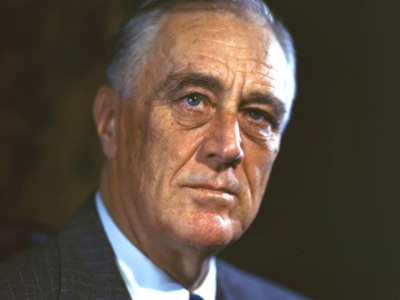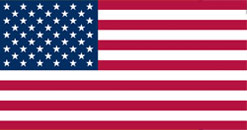Franklin Delano Roosevelt (1882-1945)
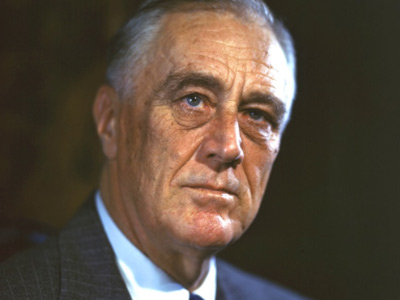
Third Term (1941–1945)
Lead-up to the War
Roosevelt's third term was dominated by World War II. By 1940, re-armament was in high gear, partly to expand and re-equip the Army and Navy and partly to become the "Arsenal of Democracy" for Britain and other countries.
With his famous Four Freedoms speech in January 1941, Roosevelt laid out the case for an American defense of basic rights throughout the world. Assisted by Willkie, Roosevelt won Congressional approval of the Lend-Lease program, which directed massive military and economic aid to Britain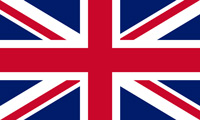 The British Empire, was composed of the dominions, colonies, protectorates, mandates, and other territories ruled or administered by the United Kingdom and its predecessor states. At its height it was the largest empire in history and, for over a century, was the foremost global power. By the start of the 20th century, Germany and the United States had begun to challenge Britain's economic lead. and China. In sharp contrast to the loans of World War I
The British Empire, was composed of the dominions, colonies, protectorates, mandates, and other territories ruled or administered by the United Kingdom and its predecessor states. At its height it was the largest empire in history and, for over a century, was the foremost global power. By the start of the 20th century, Germany and the United States had begun to challenge Britain's economic lead. and China. In sharp contrast to the loans of World War I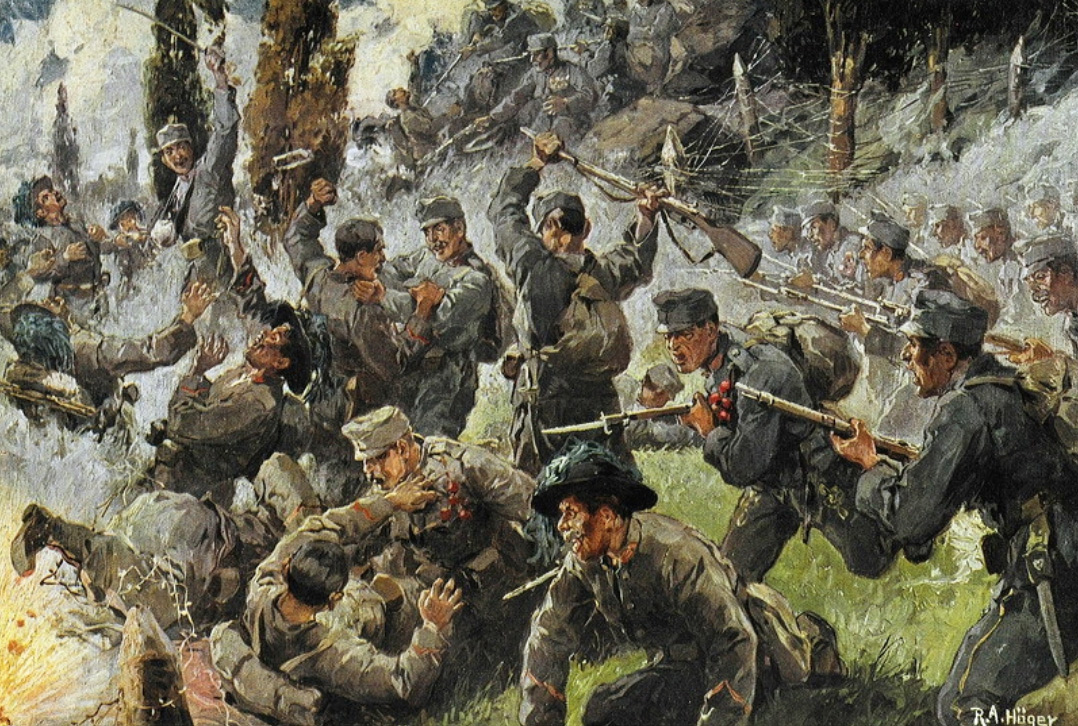 World War I, also known as the First World War, or the Great War, was a global war originating in Europe that lasted from 28 July 1914 to 11 November 1918. More than 70 million military personnel, including 60 million Europeans, were mobilized in one of the largest wars in history. The war drew in all the world's economic great powers, assembled in two opposing alliances: the Allies versus the Central Powers of Germany and Austria-Hungary. View World War I », there would be no repayment after the war.
World War I, also known as the First World War, or the Great War, was a global war originating in Europe that lasted from 28 July 1914 to 11 November 1918. More than 70 million military personnel, including 60 million Europeans, were mobilized in one of the largest wars in history. The war drew in all the world's economic great powers, assembled in two opposing alliances: the Allies versus the Central Powers of Germany and Austria-Hungary. View World War I », there would be no repayment after the war.
As Roosevelt took a firmer stance against the Axis Powers of Japan, Germany, and Italy, American isolationists such as Charles Lindbergh and the America First Committee vehemently attacked Roosevelt as an irresponsible warmonger. When Germany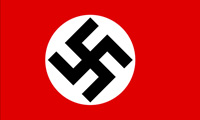 Nazi Germany (officially known as the German Reich from 1933 until 1943, and the Greater German Reich from 1943 to 1945) was the German state between 1933 and 1945, when Adolf Hitler and the Nazi Party controlled the country, transforming it into a dictatorship. Under Hitler's rule, Germany quickly became a totalitarian state where nearly all aspects of life were controlled by the government. invaded the Soviet Union
Nazi Germany (officially known as the German Reich from 1933 until 1943, and the Greater German Reich from 1943 to 1945) was the German state between 1933 and 1945, when Adolf Hitler and the Nazi Party controlled the country, transforming it into a dictatorship. Under Hitler's rule, Germany quickly became a totalitarian state where nearly all aspects of life were controlled by the government. invaded the Soviet Union Soviet Union, officially the Union of Soviet Socialist Republics (USSR), was a transcontinental country that spanned much of Eurasia from 1922 to 1991. The Soviet Union fall process began with growing unrest in the Union's various constituent national republics developing into an incessant political and legislative conflict between them and the central government. Estonia was the first Soviet republic to declare state sovereignty inside the Union. in June 1941, Roosevelt agreed to extend Lend-Lease to the Soviets. Thus, Roosevelt had committed the U.S. to the Allied side with a policy of "all aid short of war."
Soviet Union, officially the Union of Soviet Socialist Republics (USSR), was a transcontinental country that spanned much of Eurasia from 1922 to 1991. The Soviet Union fall process began with growing unrest in the Union's various constituent national republics developing into an incessant political and legislative conflict between them and the central government. Estonia was the first Soviet republic to declare state sovereignty inside the Union. in June 1941, Roosevelt agreed to extend Lend-Lease to the Soviets. Thus, Roosevelt had committed the U.S. to the Allied side with a policy of "all aid short of war."
In August 1941, Roosevelt and Churchill conducted a highly secret bilateral meeting in which they drafted the Atlantic Charter, conceptually outlining global wartime and postwar goals. This would be the first of several wartime conferences; Churchill and Roosevelt would meet ten more times in person. Though Churchill pressed for an American declaration of war against Germany, Roosevelt believed that Congress would reject any attempt to bring the United States into the war. In September, a German submarine fired on the U.S. destroyer Greer, and Roosevelt declared that the U.S. Navy would assume an escort role for Allied convoys in the Atlantic as far east as Great Britain and would fire upon German ships or submarines (U-boats) of the Kriegsmarine if they entered the U.S. Navy zone. This "shoot on sight" policy effectively declared naval war on Germany and was favored by Americans by a margin of 2-to-1.
Pearl Harbor and Declarations of War
After the German invasion of Poland Poland, officially the Republic of Poland, and in historical context referred to as the Third Polish Republic, is a country in Central Europe. The Kingdom of Poland emerged in 1025 and in 1569 cemented its longstanding association with Lithuania, thus forming the Polish–Lithuanian Commonwealth. It was one of the largest great powers of Europe at the time, with a uniquely liberal political system that adopted Europe's first modern constitution in 1791., the primary concern of both Roosevelt and his top military staff was on the war in Europe, but Japan
Poland, officially the Republic of Poland, and in historical context referred to as the Third Polish Republic, is a country in Central Europe. The Kingdom of Poland emerged in 1025 and in 1569 cemented its longstanding association with Lithuania, thus forming the Polish–Lithuanian Commonwealth. It was one of the largest great powers of Europe at the time, with a uniquely liberal political system that adopted Europe's first modern constitution in 1791., the primary concern of both Roosevelt and his top military staff was on the war in Europe, but Japan The Empire of Japan, also known as the Japanese Empire or Imperial Japan, was a historical nation-state and great power that existed from the Meiji Restoration in 1868 until the enactment of the post-World War II 1947 constitution and subsequent formation of modern Japan. Economic and political turmoil in the 1920s led to the rise of militarism, nationalism and totalitarianism eventually culminating in Japan's membership in the Axis alliance. also presented foreign policy challenges. Relations with Japan had continually deteriorated since its invasion of Manchuria in 1931, and they had further worsened with Roosevelt's support of China in the Second Sino-Japanese War. With the war in Europe occupying the attention of the major colonial powers, Japanese leaders eyed vulnerable colonies such as the Dutch East Indies, French Indochina, and British Malaya. After Roosevelt announced a $100 million loan to China in reaction to Japan's occupation of northern French Indochina, Japan signed the Tripartite Pact with Germany and Italy
The Empire of Japan, also known as the Japanese Empire or Imperial Japan, was a historical nation-state and great power that existed from the Meiji Restoration in 1868 until the enactment of the post-World War II 1947 constitution and subsequent formation of modern Japan. Economic and political turmoil in the 1920s led to the rise of militarism, nationalism and totalitarianism eventually culminating in Japan's membership in the Axis alliance. also presented foreign policy challenges. Relations with Japan had continually deteriorated since its invasion of Manchuria in 1931, and they had further worsened with Roosevelt's support of China in the Second Sino-Japanese War. With the war in Europe occupying the attention of the major colonial powers, Japanese leaders eyed vulnerable colonies such as the Dutch East Indies, French Indochina, and British Malaya. After Roosevelt announced a $100 million loan to China in reaction to Japan's occupation of northern French Indochina, Japan signed the Tripartite Pact with Germany and Italy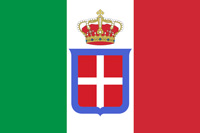 The Kingdom of Italy was a state that existed from 1861, when Victor Emmanuel II of Sardinia was proclaimed King of Italy, until 1946. The state resulted from a decades-long process, the Risorgimento, of consolidating the different states of the Italian Peninsula into a single state. That process was influenced by the Savoy-led Kingdom of Sardinia, which can be considered Italy's legal predecessor state.. The pact bound each country to defend the other against attack, and Germany, Japan, and Italy became known as the Axis powers. Overcoming those who favored invading the Soviet Union, the Japanese Army high command successfully advocated for the conquest of Southeast Asia to ensure continued access to raw materials. In July 1941, after Japan occupied the remainder of French Indochina, Roosevelt cut off the sale of oil to Japan, depriving Japan of more than 95 percent of its oil supply. He also placed the Philippine military under American command and recalled General Douglas MacArthur into active duty to command U.S. forces on the Philippines.
The Kingdom of Italy was a state that existed from 1861, when Victor Emmanuel II of Sardinia was proclaimed King of Italy, until 1946. The state resulted from a decades-long process, the Risorgimento, of consolidating the different states of the Italian Peninsula into a single state. That process was influenced by the Savoy-led Kingdom of Sardinia, which can be considered Italy's legal predecessor state.. The pact bound each country to defend the other against attack, and Germany, Japan, and Italy became known as the Axis powers. Overcoming those who favored invading the Soviet Union, the Japanese Army high command successfully advocated for the conquest of Southeast Asia to ensure continued access to raw materials. In July 1941, after Japan occupied the remainder of French Indochina, Roosevelt cut off the sale of oil to Japan, depriving Japan of more than 95 percent of its oil supply. He also placed the Philippine military under American command and recalled General Douglas MacArthur into active duty to command U.S. forces on the Philippines.
The Japanese were incensed by the embargo and Japanese leaders became determined to attack the United States unless it lifted the embargo. The Roosevelt administration was unwilling to reverse policy, and Secretary of State Hull blocked a potential summit between Roosevelt and Prime Minister Fumimaro Konoe. After diplomatic efforts to end the embargo failed, the Privy Council of Japan authorized a strike against the United States. The Japanese believed that the destruction of the United States Asiatic Fleet (stationed in the Philippines) United States Pacific Fleet (stationed at Pearl Harbor in Hawaii) was vital to the conquest of Southeast Asia. On the morning of December 7, 1941, the Japanese struck the U.S. naval base at Pearl Harbor with a surprise attack, knocking out the main American battleship fleet and killing 2,403 American servicemen and civilians. At the same time, separate Japanese task forces attacked Thailand, British Hong Kong, the Philippines, and other targets. Roosevelt called for war in his famous "Infamy Speech" to Congress, in which he said: "Yesterday, December 7, 1941 — a date which will live in infamy — the United States of America was suddenly and deliberately attacked by naval and air forces of the Empire of Japan." In a nearly-unanimous vote, Congress declared war on Japan. After the Japanese attack at Pearl Harbor, antiwar sentiment in the United States largely evaporated overnight. On December 11, 1941, Hitler and Mussolini declared war on the United States, which responded in kind.
A majority of scholars have rejected the conspiracy theories that Roosevelt, or any other high government officials, knew in advance about the Japanese attack on Pearl Harbor. The Japanese had kept their secrets closely guarded. Senior American officials were aware that war was imminent, but they did not expect an attack on Pearl Harbor. Roosevelt had expected that the Japanese would attack either the Dutch East Indies or Thailand.
War Plans
In late December 1941 Churchill and Roosevelt met at the Arcadia Conference, which established a joint strategy between the U.S. and Britain. Both agreed on a Europe first strategy that would prioritize the defeat of Germany before Japan. The U.S. and Britain established the Combined Chiefs of Staff to coordinate military policy and the Combined Munitions Assignments Board to coordinate the allocation of supplies. An agreement was also reached to establish a centralized command in the Pacific theater called ABDA, named for the American, British, Dutch, and Australian forces in the theater. On January 1, 1942, the United States, Britain, China, the Soviet Union, and twenty-two other countries issued the Declaration by United Nations, in which each nation pledged to defeat the Axis powers. These countries opposed to the Axis would be known as the Allied Powers.
In 1942, Roosevelt formed a new body, the Joint Chiefs of Staff, which made the final decisions on American military strategy. Admiral Ernest J. King as Chief of Naval Operations commanded the Navy and Marines, while General George C. Marshall led the Army and was in nominal control of the Air Force, which in practice was commanded by General Hap Arnold. The Joint Chiefs were chaired by Admiral William D. Leahy, the most senior officer in the military. Roosevelt avoided micromanaging the war and let his top military officers make most decisions. Roosevelt's civilian appointees handled the draft and procurement of men and equipment, but no civilians – not even the secretaries of War or Navy, had a voice in strategy. Roosevelt avoided the State Department and conducted high level diplomacy through his aides, especially Harry Hopkins, whose influence was bolstered by his control of the Lend Lease funds.
Wartime Conferences
Roosevelt coined the term "Four Policemen" to refer the "Big Four" Allied powers of World War II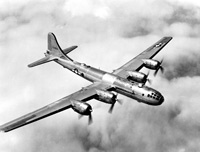 World War II or the Second World War, often abbreviated as WWII or WW2, was a world war that lasted from 1939 to 1945. It involved the vast majority of the world's countries—including all of the great powers—forming two opposing military alliances: the Allies and the Axis powers. World War II was a total war that directly involved more than 100 million personnel from more than 30 countries. World War II is generally considered to have begun on 1 September 1939, when Nazi Germany, under Adolf Hitler, invaded Poland. View World War II », the United States, the United Kingdom, the Soviet Union and China. The "Big Three" of Roosevelt, Churchill, and Soviet leader Joseph Stalin, together with Chinese Generalissimo Chiang Kai-shek, cooperated informally on a plan in which American and British troops concentrated in the West; Soviet troops fought on the Eastern front; and Chinese, British and American troops fought in Asia and the Pacific. The United States also continued to send aid via the Lend-Lease program to the Soviet Union and other countries. The Allies formulated strategy in a series of high-profile conferences as well as contact through diplomatic and military channels. Beginning in May 1942, the Soviets urged an Anglo-American invasion of German-occupied France in order to divert troops from the Eastern front. Concerned that their forces were not yet ready for an invasion of France, Churchill and Roosevelt decided to delay such an invasion until at least 1943 and instead focus on a landing in North Africa, known as Operation Torch.
World War II or the Second World War, often abbreviated as WWII or WW2, was a world war that lasted from 1939 to 1945. It involved the vast majority of the world's countries—including all of the great powers—forming two opposing military alliances: the Allies and the Axis powers. World War II was a total war that directly involved more than 100 million personnel from more than 30 countries. World War II is generally considered to have begun on 1 September 1939, when Nazi Germany, under Adolf Hitler, invaded Poland. View World War II », the United States, the United Kingdom, the Soviet Union and China. The "Big Three" of Roosevelt, Churchill, and Soviet leader Joseph Stalin, together with Chinese Generalissimo Chiang Kai-shek, cooperated informally on a plan in which American and British troops concentrated in the West; Soviet troops fought on the Eastern front; and Chinese, British and American troops fought in Asia and the Pacific. The United States also continued to send aid via the Lend-Lease program to the Soviet Union and other countries. The Allies formulated strategy in a series of high-profile conferences as well as contact through diplomatic and military channels. Beginning in May 1942, the Soviets urged an Anglo-American invasion of German-occupied France in order to divert troops from the Eastern front. Concerned that their forces were not yet ready for an invasion of France, Churchill and Roosevelt decided to delay such an invasion until at least 1943 and instead focus on a landing in North Africa, known as Operation Torch.
In late 1943, Roosevelt, Churchill, and Stalin agreed to meet to discuss strategy and post-war plans, and at the Tehran Conference, Roosevelt met with Stalin for the first time. At the conference, Britain and the United States committed to opening a second front against Germany in 1944, while Stalin committed to entering the war against Japan at an unspecified date. Subsequent conferences at Bretton Woods and Dumbarton Oaks established the framework for the post-war international monetary system and the United Nations, an intergovernmental organization similar to Wilson's failed League of Nations.
Roosevelt, Churchill, and Stalin met for a second time at the February 1945 Yalta Conference. With the end of the war in Europe approaching, Roosevelt's primary focus was on convincing Stalin to enter the war against Japan; the Joint Chiefs had estimated that an American invasion of Japan would cause as many as one million American casualties. In return for the Soviet Union's entrance into the war against Japan, the Soviet Union was promised control of Asian territories such as Sakhalin Island. The three leaders agreed to hold a conference in 1945 to establish the United Nations (UN)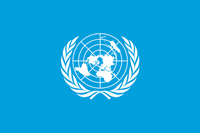 United Nations (UN) is an intergovernmental organization whose stated purposes are to maintain international peace and security, develop friendly relations among nations, achieve international cooperation, and be a centre for harmonizing the actions of nations. The UN was established after World War II with the aim of preventing future world wars, succeeding the League of Nations, which was characterized as ineffective., and they also agreed on the structure of the United Nations Security Council, which would be charged with ensuring international peace and security. Roosevelt did not push for the immediate evacuation of Soviet soldiers from Poland, but he won the issuance of the Declaration on Liberated Europe, which promised free elections in countries that had been occupied by Germany. Germany itself would not be dismembered, but would be jointly-occupied by the United States, France, Britain, and the Soviet Union. Against Soviet pressure, Roosevelt and Churchill refused to consent to imposing huge reparations and deindustrialization on Germany after the war. Roosevelt's role in the Yalta Conference has been controversial; critics charge that he naively trusted the Soviet Union to allow free elections in Eastern Europe, while supporters argue that there was little more that Roosevelt could have done for the Eastern European countries given the Soviet occupation and the need for cooperation with the Soviet Union during and after the war.
United Nations (UN) is an intergovernmental organization whose stated purposes are to maintain international peace and security, develop friendly relations among nations, achieve international cooperation, and be a centre for harmonizing the actions of nations. The UN was established after World War II with the aim of preventing future world wars, succeeding the League of Nations, which was characterized as ineffective., and they also agreed on the structure of the United Nations Security Council, which would be charged with ensuring international peace and security. Roosevelt did not push for the immediate evacuation of Soviet soldiers from Poland, but he won the issuance of the Declaration on Liberated Europe, which promised free elections in countries that had been occupied by Germany. Germany itself would not be dismembered, but would be jointly-occupied by the United States, France, Britain, and the Soviet Union. Against Soviet pressure, Roosevelt and Churchill refused to consent to imposing huge reparations and deindustrialization on Germany after the war. Roosevelt's role in the Yalta Conference has been controversial; critics charge that he naively trusted the Soviet Union to allow free elections in Eastern Europe, while supporters argue that there was little more that Roosevelt could have done for the Eastern European countries given the Soviet occupation and the need for cooperation with the Soviet Union during and after the war.
HISTORY
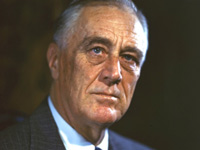
RESOURCES
This article uses material from the Wikipedia article "Franklin Delano Roosevelt (1882-1945)", which is released under the Creative Commons Attribution-Share-Alike License 3.0.
© Stories Preschool. All Rights Reserved.
